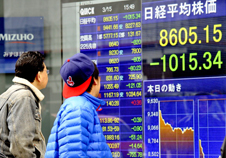After earthquake, rebuilding Japan’s economy

The effects of last week’s earthquake and tsunami in northeast Japan are likely to have an economic impact far beyond that region, according to recent news reports. We spoke with Northeastern’s Allan Bird, the Darla and Frederick Brodsky Trustee Professor in Global Business, who lived in Japan for eight years, and has worked with Japanese government and private-sector organizations since 1974.
What are the immediate implications for Japan’s economy and the global economy? How will Japan financially support the efforts (reconstruction, etc.) necessary to recover from the devastation caused by the earthquake and tsunami?
The Japanese economy has been limping along for nearly two decades, lacking vitality and wrestling with the challenges of a matured manufacturing sector and an aging population. The damage to the infrastructure in the region most affected is significant and will take years to rebuild — roads and bridges have been washed out, ports have been severely damaged, and the ongoing nuclear troubles will not be easily resolved. At the national level, just-in-time delivery systems have been severely impacted due to the need to cut back on energy consumption. Japanese production and manufacturing is tightly integrated, so widespread disruptions have rippled through the system.
Already we are seeing Japanese companies shift dollar holdings and repatriate capital from overseas operations to pay for the recovery. The Japanese central bank is also converting dollar holdings in order to finance the reconstruction efforts that will be required.
What long-term impact could these recent tragedies have on Japan’s economic power and on global business?
The Japanese economy is the third largest in the world, behind only the United States and China (which only recently surpassed Japan). The economic impact on Japan will have global ripple effects. At the same time, there has been a sense in Asia over the last decade that the future belongs to India and China, and that Japan’s influence will wane. These events will hasten the decline of influence and increase the perception that Japan is less important.
Taking a longer view, however, I think it would be unwise to count Japan out. Sixty years ago, it was widely believed, following its near complete economic devastation from World War II, that Japan would become a prosperous but relatively unimportant economic player in the world. We know how that turned out. It would be unwise to discount the drive and ambition of the Japanese as they work to rebuild their country and their economy.
Are there some industries or exports that might be more affected than others?
Rather than focus on specific industries or exports, it may be more useful to focus on the types of firms most affected. Only one in eight Japanese workers is employed in a company with 300 or more employees. The region most affected by the quake and tsunami is largely populated by small and medium-sized firms, many of which supplied parts for the automotive industry or components for the electronics industry. Manufacturers around the world — not just Japanese, but other Asian, North American, and European firms — are now in a scramble to find replacement suppliers. At the same time, recovery for many of these firms will be difficult due to the fact that they were already grappling with an aging workforce and a movement by the younger generation away from rural regions.





